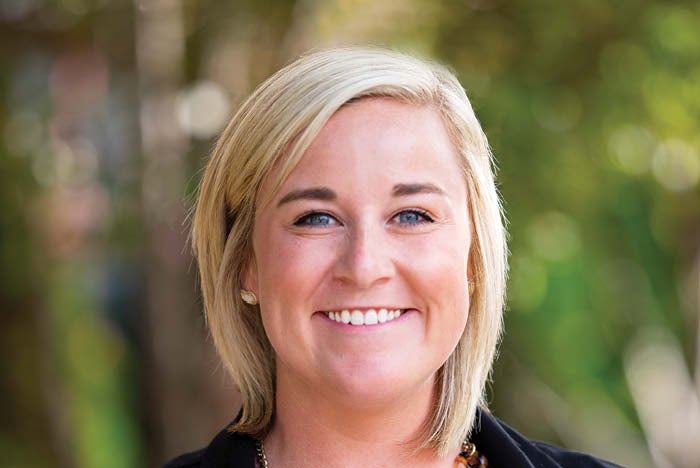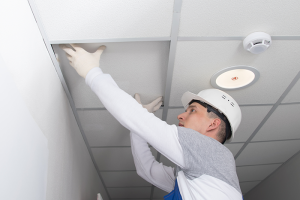Young professional brings fresh energy to ASHE

The Lauck File
CV
- Marketing and client developer, CMTA Inc., Indianapolis.
- Project manager, Faithful+Gould, Dallas.
- Project coordinator, Major Hospital/Major Health Partners, Shelbyville, Ind.
Accomplishments
- Chair of ASHE Young Professionals Task Force.
- Former Indiana Society for Healthcare Engineering board member.
- ASHE Chapter Relations Committee.
- Project Management Professional certification.
Education
- Bachelor of science in health services management, Indiana University – Purdue University, Indianapolis
Abby Lauck, PMP, serves as chair of the Young Professionals Task Force within the American Society for Health Care Engineering (ASHE). This month, she talks with Health Facilities Management about how she started her career and offers advice to other young professionals advancing in the field of health care engineering.
What inspired you to pursue health care, and how did you get your start?
I have always known that health care was the field I wanted to be in. Growing up, my dad did a lot of work with hospitals in central Indiana. He would always talk about how it’s a great field to be in and, most importantly, it’s a field where you are helping people.
I started my undergrad studying nursing. At the time, I was a student-athlete at University of St. Francis in Ft. Wayne, Ind., and taking pre-nursing classes my first year. I got through my first clinical and knew that I loved being in health care, but nursing wasn’t for me. I did some research on different bachelor programs and decided that, after two years, I wanted to transfer to Indiana University — Purdue University, Indianapolis, and study health services management in the Fairbanks School of Public Health.
In my final semester, I took a health care ethics class. I was required to write a term paper in which I interviewed someone on the provider side of health care and someone who was a recent patient. The point was to understand both perspectives of health care: the consumer/hospital and the provider/patient. Remembering my dad’s hospital connections, I asked him if he knew someone I could interview. I didn’t know it at the time, but he introduced me to my future boss and employer. I interviewed my first boss, Jeff Williams at Major Health Partners (MHP), Shelbyville, Ind., who is the vice president of facility operations.
Little did I know that six months later, he would call me to meet for lunch and offer me a job as a project coordinator for their new replacement hospital project. It was not only my first job, but it was also my first time being on a very large construction project. That job jump-started my career in health care engineering.
Tell us about your role today and how you made the transition.
Today, I work for CMTA Inc. We are a MEP consulting engineering firm that is focused on building science leadership and designing cost-effective, energy-efficient, high-performance buildings. I am the marketing and client developer in the Indianapolis office. My focus is to help build CMTA’s presence in the Indiana market and nationally in the health care market. In addition, I support the Indianapolis office with any of their marketing needs. CMTA is not only in the health care market, our other major markets include K-12, higher education, and federal and local government.
Prior to coming to CMTA and after MHP, I worked at Faithful+Gould (F+G) as a project manager in Dallas. I decided after working on the owner side for three years, I was ready to take what I learned at MHP and go to the consulting world to help other hospitals like MHP.
At F+G, I started as a project coordinator and then became a project manager after I achieved my Project Management Professional certification. F+G does initial outfitting and transition for health care entities, both federal and non-federal. F+G handles all things to get a hospital ready for that first patient day, including equipment planning, procurement, warehouse management, logistics, equipment training and transition planning.
My background being both on the owner side and consulting side allows me to bring a different perspective to CMTA. I have seen how a project is executed from both perspectives, and I think that knowledge has prepared me to be a strong business development person.
What did you gain by joining local ASHE chapters early in your career?
By being involved in my local ASHE chapters, it brought me a wealth of contacts. In Indiana, I was fortunate enough to be part of the Indiana Society for Healthcare Engineering’s board of directors for about a year. Prior to being on the board, I attended meetings pretty regularly and eventually asked one of the more senior board members about how I could be more involved. Once I said “yes” to being on a committee, doors opened, and next thing I know, I am a board member and involved at a national level.
In addition to gaining many great contacts, the educational piece that local chapters offered was very helpful. Going to different meetings and learning about projects different health care systems did that were similar to what we were working on at MHP was extremely helpful. It allowed me to understand another approach to our projects.
How have you been involved in ASHE on the national level?
I have been on ASHE’s Young Professionals Task Force for about three years now. I was asked to be a part of this task force when Tim Adams (former director of leadership development) was still with ASHE. He was looking for young professionals (YPs) who were involved in their local chapters and were interested in becoming more involved nationally. This task force was meant to help draw more YPs into the health care engineering world, help us develop in our careers and build a network of like-minded YPs. Currently, I am the chair of the task force, and Caleb Haynes is our co-chair.
Our YP Task Force has been fortunate enough to be a part of some great projects within ASHE. We have been asked to be on various committees and help plan networking events. Prior to the pandemic, our group had scheduled several networking opportunities for YPs at conferences, and we are planning to continue those networking opportunities once it is safe to do so. We continue to work with various SMEs for ASHE education, and are involved in numerous committees/task forces, including conference planning, operational excellence, Member Tool Task Force and the ASHE COVID-19 team.
One project our group worked on was a COVID-19 checklist for hospitals/health care entities to help them prepare for opening their hospitals back up to visitors and non-emergent patients. This checklist can be found on the ASHE website at ashe.org/covid-19-recovery.
What encouragement would you give to another young professional in the field?
Always say “yes” to different opportunities and be willing to step outside your comfort zone. It can be intimidating to go to an event (in-person or virtual) alone, but those events are usually the venues where you meet someone new or get connected with someone you’ve been wanting to meet. Those types of opportunities are what make you more comfortable at future events.
Never be afraid to speak up and volunteer to be on a committee or task force not only within ASHE, but also with different professional societies within the health care field. Those types of volunteer opportunities help you figure out which group is right for you and your professional growth. In addition, professional societies open up an even larger network and provide access to all types of educational resources.
Do you have any advice for those responsible for hiring, recruiting and developing young professionals?
Culture is very important, and for young professionals starting off in their career, having a supportive and motivating environment will help them grow into the professionals they strive to be. In addition, I think it’s important for employers to understand that young professionals are still learning and are extremely early in their careers. Creating an environment where it’s OK to make mistakes as you learn from them is critical.
For those people looking to recruit and help develop YPs, volunteer to be a mentor! Having a mentor in this field is so valuable and helpful.




